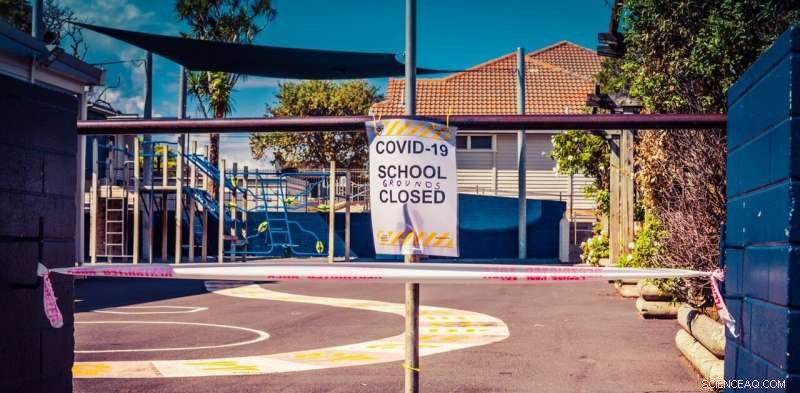
Kredit:Shutterstock
Nyheten att alla anställda vid en liten King Country-skola fortfarande var ovaccinerade en vecka efter regeringens obligatoriska deadline den 15 november understryker hur utmanande de kommande veckorna kan vara.
Nästa måndag markerar dagen att lärare måste ha fått minst en dos av covid-19-vaccinet om de vill fortsätta arbeta med elever i en inlärningsmiljö ansikte mot ansikte.
Det kommer också att vara den dag då utbildningsledare med viss säkerhet får reda på vilka deras vaccintveksamma kollegor är, och när många engagerade pedagogers karriärvägar kommer att hamna vid ett vägskäl.
Eftersom det verkar troligt att vissa skolor kommer att möta betydande personalbrist, måste läraryrket nu på allvar brottas med hur man ska visa värdet av manaakitanga för alla kollegor, inklusive de ovaccinerade.
COVID-19:All personal på lilla King Country school vägrar vaccin före nästa veckas deadline https://t.co/fDKGzVpbj9
— RNZ News (@rnz_news) 8 november 2021
Ansvarskoden
Som en fullständigt registrerad lärare (liksom akademiker) kommer jag att vara fri att undervisa i Nya Zeelands skolor, med beredskapsnivåer, eftersom jag är dubbelvaccinerad. Men jag vet att det inte är fallet för några av mina mycket begåvade och engagerade kollegor som har tackat nej till Pfizer-jabben.
Jag kan bara föreställa mig vilka yrkesidentitetskriser som dessa kollegor måste uppleva.
Jag tänker på de lärare som uppriktigt tror att de hedrar sitt engagemang för samhället – som förespråkas i Teaching Council of Aotearoa New Zealand (TCANZ) Code of Professional Responsibility – genom att stå upp för Nya Zealanders mänskliga rättigheter till kroppslig autonomi.
Jag tänker på de lärare som passionerat tror att de hedrar sitt engagemang för samhället genom att visa den etiska integriteten att stå upp mot en makt som de tror vilseleder allmänheten.
Jag tänker på de lärare som tror att de "pratar" om en kritiskt reflekterande utövare genom att vägra att bli vaccinerad.
Och jag tänker på mitt eget engagemang för dessa lärare som mina professionella kollegor, trots min grundläggande oenighet med deras anti-vaccinationsuppfattning.
Undervisning som en etisk aktivitet
TCANZ vägledande dokument för lärare – vår kod, våra standarder – beskriver alla lärares etiska åtaganden. The council recognizes that for the code to be "owned," the professional commitments should not be seen as a list of prescribed rules.
Rather, it is a set of agreed aspirations that encourage collaborative conversations between practitioners about the ethical nature of their work.
There is no doubt the vaccine mandate will demand some of the most ethically challenging conversations teachers from both vaccination camps will have in their professional careers.
However, that's no reason to shy away from collegial awkwardness. One of New Zealand's pre-eminent educational thinkers, the late Ivan Snook, believed teaching is an innately ethical activity as it involves close personal relationships, not least between colleagues.
Snook also provides us with some wise guidance on how we might go about these challenging discussions. He addresses the fundamental tension teachers face when trying to persuade others to take a on a point of view they believe is demonstrably rational.
Snook frames this tension as the "conflicting obligations to respect the learner's state of mind and also move her towards a more adequate understanding and a more enlightened practice."
An ethic of care
As colleagues in discussion with those who disagree with us on the vaccine mandate, we must be ready to respect the ethical integrity of alternative viewpoints, while providing rational alternatives based on reputable scientific evidence.
Nor should we decry those who distrust authority. As Snook argues, a major task of educators is to help others come to understand the importance, and limitations, of all authorities.
It is my hope that over the next few months we will see the code truly become "our code" as it guides vaccinated and unvaccinated teachers to have these respectful conversations about what it is to be a critically reflective, ethical teacher in a society in the grip of a global pandemic.
But if the code is to guide teachers through these difficult conversations it needs to be used with care. If it's simply a weapon of entrenched positions there is nothing to be gained.
Educational philosopher Nel Noddings said conversations of this complexity need to happen within an "ethic of care" that is sensitive to the relationships in which we must all continue to live.
In the spirit of whanaungatanga, I encourage my vaccinated and unvaccinated colleagues to be courageous and use the code to discuss the vaccine mandate within such an ethic of care.
Let us decide together what that is, and what it means to be an ethical teacher in Aotearoa New Zealand in this watershed moment for our profession.